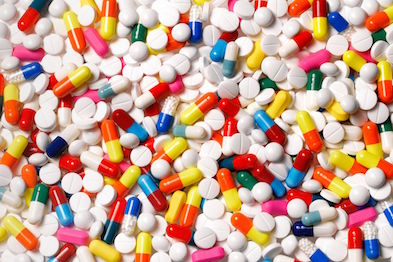Supplements: Too Much of a Good Thing?

Ever hear the expression “too much of a good thing?” It’s never truer than when it comes to supplements. Everyone needs the right about of vitamins and minerals to be healthy, but too much of a good thing can be deadly.
Take vitamin C. The idea that loading up on vitamin C can prevent or cure a cold has become so ingrained in people’s minds it has become “fact.” While the nutrient does play a role in supporting a healthy immune system, going for a huge dose won’t keep you from catching a cold and that’s a fact backed up by research. Plus you don’t need a supplement. It’s relatively easy to get your recommended daily dosage, which the Mayo Clinic reports is between 65 and 90 milligrams. One cup of chopped red bell pepper is more than double that amount. Add that to the fact that overdosing on Vitamin C can cause nausea and diarrhea, and given too much you could experience symptoms like insomnia and kidney stones. Just eat a salad. It tastes better and is healthier for you.
Now let’s take a look at a favorite of gym-goers…creatine. Often touted as a muscle-building miracle, this amino acid occurs naturally in our bodies, as well as in meat, but many lifters look to supplements. Several high-quality studies have shown an increase in muscle mass with creatine use, however the trouble here is the overzealous quest to build muscle leads many to take unsafe doses. According to the University of Maryland Medical Center, supplementing your diet with too much creatine can lead to upset stomach, dizziness, high blood pressure, and maybe even kidney damage. Creatine can also interact with certain medications, so talk to your doctor before you decide to try this.
Now let’s talk about fish oil…the recent “darling” of the supplement industry. Omega-3 fatty acids play important roles in brain function, normal growth and development, and inflammation. Deficiencies have been linked to a variety of health problems, including cardiovascular disease, some cancers, mood disorders, arthritis, and more. But that doesn’t mean taking high doses of Fish Oil translates to better health and disease prevention. Fish oil supplements have been promoted as an easy way to protect the heart, ease inflammation, improve mental health, and lengthen life. Such claims are one reason why Americans spend more than $1 billion a year on over-the-counter fish oil. Unfortunately, results for these pills don’t match up with the real thing. One recent review found fish oil supplements didn’t show any link to a reduced risk of heart disease. According to Livestrong, too much fish oil can lead to upset stomach and bloating. In severe cases, it can even contribute to bloody urine and stroke. The bad news doesn’t end there, either. A study by scientists at the Fred Hutchinson Cancer Research Center in Seattle linked eating a lot of oily fish or taking potent fish oil supplements to a 43% increased risk for prostate cancer overall, and a 71% increased risk for aggressive prostate cancer. (Their report was published online in the Journal of the National Cancer Institute.)
Another darling of the supplement industry is vitamin E. Antioxidants like vitamin E get a lot of love from the health-conscious crowd for their ability to fight cancer, but that’s not exactly the truth. The National Cancer Institute was so hopeful that vitamin E supplements would decrease rates of prostate cancer that in 2001 it funded a study designed to test the theory. The findings revealed that the men who took vitamin E were 17 percent more likely—not less—to develop the disease. In 2008, the Physicians’ Health Study II also produced negative results: Among more than 14,000 male doctors taking high doses of vitamin C or E for eight years, neither supplement reduced heart attacks, strokes or cardiovascular deaths. In fact, vitamin E slightly increased the risk of hemorrhagic (bleeding) strokes. In 2010, a meta-analysis published in BMJ concluded that while vitamin E reduces the risk of ischemic stroke by 10 percent, it increases the risk of hemorrhagic stroke by 22 percent. Thus, the researchers warned against widespread use of vitamin E. Even the less-extreme results are unpleasant. Everyday Health says too much vitamin E can lead to fatigue, blurred vision, nausea, and rash. Again, you can get enough of this vitamin with a proper diet. To get your RDA of vitamin E, simply nosh of a handful of almonds, or include foods like wheat germ, sunflower seeds, and broccoli in your meal plans.
The bottom line is if you eat a healthy diet, you’ll get all your essential vitamins and minerals from the foods you eat. If you think you still need a supplement, please consult your doctor. Simply guessing and dosing on supplements could be doing more harm than good.





